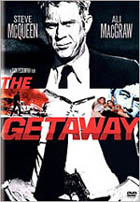 BUY IT AT AMAZON: CLICK HERE!
BUY IT AT AMAZON: CLICK HERE!
STUDIO: Warner Bros.
MSRP: $15.97 RATED: PG
RUNNING TIME: 123 Mins.
SPECIAL FEATURES:
• Commentary by Peckinpah Biographers/Documentarians Nick Redman, Paul Seydor, Garner Simmons and David Weddle
• “Virtual” Audio Commentary by Steve McQueen, Ali MacGraw and Sam Peckinpah
• Theatrical Trailer
Note: This DVD is part of The Essential Steve McQueen Collection (Save your hard earned cash and purchase it from CHUD immediately!)
Sam Peckinpah’s most Hollywood film (therefore, his most accessible to the masses) is his filmic adaptation of Jim Thompson’s novel of The Getaway (which I should note right off the bat, I’ve never read). Scripted by Walter Hill, the movie places three hard-hitting heavyweights of masculinity (Hill, Peckinpah, and McQueen) together with some odd results. This isn’t to say that the film is terrific, but rather as a whole the film has Peckinpah reeling himself inward and entertaining himself outward. As an aside and a curiosity, I’ve been driving home the point (for those keeping score, this is my nine billionth time since forever ago) that this was the film that split up Ali MacGraw and then head of Paramount Pictures, Robert Evans. MacGraw ran into the bulging manly man pantsack of McQueen while Evans ran into miles and miles of cocaine (or so he’s mentioned). Roman Polanski even ran away to Europe on statutory rape charges, but that’s a whole other story entirely (and shouldn’t diminish his artistry). Either way, The Getaway had some unintended causalities all around, the least of all being Sally Struthers.
While the new era of Hollywood was being ushered in all around this film, it stands as a test of time to see Peckinpah working alongside some new tricks to tell his relatively thrilling easy-on-the-eyes story. The fact that a 30+ year old film still retains those aspects to it that made it so enjoyable back in the day is a clear message to the free-floating corpse of Peckinpah and the "thirty cents a day" pleas of Struthers.
The Flick
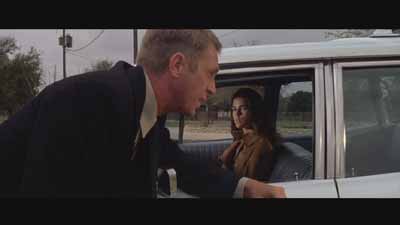
"I think it’s time I went in there and teach those kids some
manners – by blowing that day care center to kingdom come!"
Freeze framing our way into a maximum security prison (complete with deer, much like New England), we meet master thief and hyper-sexually charged Carter "Doc" McCoy (Steve McQueen), a man whose stylish tinted shades help to obscure a coolness unseen since, well, since ever, really. He’s chomping at the bit for a little alone time with something else besides his trusted righty, so he sends wife Carol (Ali MacGraw) to the inner sanctum of dirty politician (and possible Republican) Jack Benyon (Ben Johnson). It’s when Doc gets out of jail rather quickly where we begin to realize that something isn’t right. Is it possible that Carol used a little inner thigh massage towards getting a certain bill amended? Yes, although don’t tell Doc.
Benyon has some plans for his newfound compadre, and before Doc can experience a sort-of pseudo sexual dysfunction, he’s whisked into the part where he has to do another job for Benyon, that is, if he wants to continue to be as free as a bird. The heist revolves around a family bank, one that Benyon knows best, and contains around a cool $500 thousand in greenbacks. Benyon throws Doc Rudy Butler (the asshole that is Al Lettieri) and Frank Jackson (Bo Hopkins) into his party, only as things begin to heat up, focusing in on the seemingly quiet streets surrounding a low-key bank.
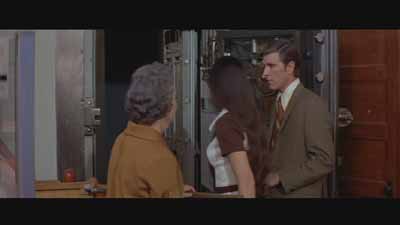
All types of ladies filed in and out of Johnson’s "vault" all day long.
As things progress as well as they can, tensions mount, and of course, Jackson ends up shooting a Security Guard into the grasp of Dr. Death (Errol Morris, nowhere to be seen) and Death returns and grabs Jackson into the netherworlds (Holland optional). As the group reforms to make Captain Planet, it’s discovered that Rudy technically has a major problem. He’d like to keep all the dough for his bad self and he’s not asking pretty-please. Guns are blazed and carefully aimed shots ring out through the midday sun. Doc is the one left standing, because, for God’s sake, it’s McQueen. One minor caveat, though, as Rudy was wearing a bulletproof vest. He’s alive, kicking, and on his way for revenge.
Doc and Carol, meanwhile, high tail it out of the area in style, where they make a side trip for some killin’. As it’s soon discovered that Carol actually has sweaty sexual relations with Benyon to get the job done, Doc’s a little more than angered by this turn of events. Therefore, we get one of the most brutal depictions of assaulted violence since my Grandfather destroyed the hell out of the Mailman for not bringing his Playboy on time. Either way, all sides are intent on converging into the Laughlin Hotel in El Paso, the designated rendezvous point for those involved that have managed to survive. All sides being those involved with Benyon, those involved with Doc, Rudy and a couple he’s kidnapped for their car (which includes Sally Struthers), and the police.
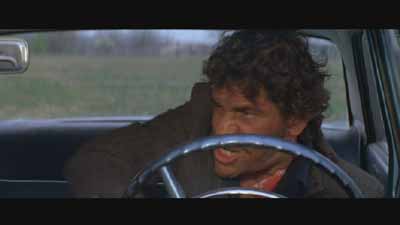
Not only does LA traffic make you crazy, but you bleed from every orifice!
The Getaway is a finely tuned picture that is only made better with the pedigree in front of and behind the camera. Sam Peckinpah, who is well known for his high-fallutin’ fancy feats of extreme gritty machismo (- take that adjectives!), brings forth his signature mix of violence and characters you love to hate, but can’t seem to take your eyes off of. Being no stranger to the ultimate showmanship of bloodied limbs, arms, and bodies, Peckinpah brings the body count to high numbers, even for a film rated PG (which is fucking incredible!). As the force of cinematic nature, he’s using a lot of handheld camera to help aid in his storytelling capabilities. The kinetically frenzied work during which Carol accidentally hands over the bag of cash to a seedy conman allows the viewer to be caught up in a very tense situation. Peckinpah’s use of slo-motion is commendable, bringing forth a sense that violence is as terrible as it shows, no matter whom the victim ultimately is.
As for his reliance upon blood, and the blood appearing real (although in today’s sense, it looks very soupy and ketchupy, but I can only imagine back then), only helps reinforce his destructive qualities and render you helpless in regards to what’s occurring on screen. Peckinpah’s characters don’t necessarily thrive off of what they have to do, they’re just people making use of situations that were never meant to have rosy outcomes. These are people who use violence as not a means to an end, but rather, as a means of escape, as a means of restoring harmony to their narrative developments. Peckinpah does appear to relish these moments, shooting them in a very balletic style, allowing for the associated horror on screen to be juxtaposed with the very beautiful qualities told through his filmmaking. It works spectacularly, and while not at his particular best here (The Wild Bunch), he’s still breaking boundaries not quite explored before with such panache.
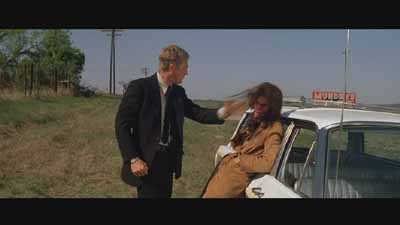
The slap that launched a thousand CHUD MB posts!
The various characters in this movie are astounding. First up is Doc, played with the cool and masculine qualities only one man could bring to them, Steve McQueen. I’m not sure how hard it is for McQueen to act like a badass in a film like this. His effortless portrayal of a man who has to contend with everything that blows up in his face makes him become this figure unparalleled throughout The Getaway. Doc is very cool, precisely calculated, and extremely quick thinking. His reliance on these qualities allows him to become the master of any situation, always with one foot towards the exit and the other on the trigger. Next up is the weak link Ali MacGraw. I’ve never considered MacGraw to be a very good actress, but here, she’s more than capable. As Carol, his scheming wife, she brings forth the adequate qualities needed to stand strong against McQueen, who’s the infinitely better actor. Namely, there’s also an odd endearing chemistry that exists on screen. Sometimes it does indeed falter, through a fault of the pair (and MacGraw, ultimately), but as a whole, they’re tremendous fun to watch as the story unfolds.
As for other characters, Rudy is the gleefully Peckinpah bad boy here. Al Lettieri brings his mustachioed slimy presence into the lives of others to such shocking accord. As he kidnaps Harold Clinton and his wife, Fran, he not only forces them to drive to El Paso, but along the way, as the trio stops at hotels, Rudy ties up Harold and proceeds to spank, touch, and have the dirtiest of sexual relations with Fran right in front of him. As Harold is subjected to this relative sexual degrading, Rudy is fulfilling the most masculine of all dreams, to get what he wants when he wants it, no matter who is in the way, or happens to be watching. Peckinpah not only allows this to continue to go on, but he makes it playful and his timing is unparalleled within the confines of the rest of the story. Like Eric Von Stroheim, he’s the bad guy you love to loathe and like Frank Booth, he just wants to get his evil rocks off.
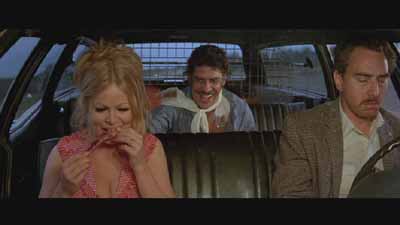
Jimmy could only sit back and watch Lou hide his meat on his wife.
On a side note, the film does suffer from a bad case of 70’s-itis, in which Quincy Jones’ funky score, complete with harmonicas, harmonious "do-wop’ing", and other assorted 70’s-sounding items help to extremely date the film into those waters. I think it probably influenced John Williams and Steven Spielberg, because that collaboration on The Sugarland Express sounds mighty similar to the musical themes at play here. Additionally, some of the set design screams "modern 70’s items!" – with their gaudy wood paneling and rather large optical glasses of Victor Von Doom. I think it adds to the period in which the film feels ‘real’, but it does date the film.
The screenplay by internet favorite Walter Hill does jettison the supposed harsh ending of the Thompson novel, rather focusing in on a more favorable outcome for our two main characters, Carol and Doc. As such, it is filled with some spectacular tension (especially with the bank robbery, the various chase sequences) and as a core of the story, the skewed relationship between McQueen and MacGraw. At it’s heart the two actors bring forth the necessary workings to make it succeed, but as a whole, I think it’s made a little lesser due to my relative dislike of MacGraw and her acting style.
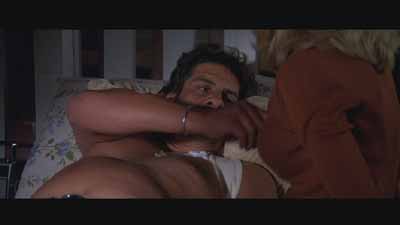
"Why yes, I do believe these are in order."
In the end though, The Getaway: Deluxe Edition (don’t bother with the horrendous Alec Baldwin remake, unless you wish to see Basinger naked) is an entertaining film that is only made better with some McQueen action.
7.0 out of 10
The Look
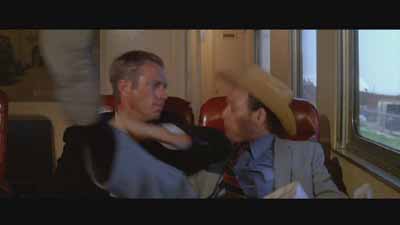
"I’m too cool for school! Have elbow!"
Presented in the films original 2.35:1 aspect ratio (anamorphic). Veteran cinematographer and frequent Peckinpah collaborator Lucien Ballard brings forth his use of a whole spectrum of colors and allows McQueen and MacGraw to stand out, even with McQueen in a form-fitting black suit and MacGraw in a tan overcoat against the relative drabness of on-location Texas filming. There’s occasionally some noise (I noticed some minor scratches and noise), but as a whole this is a great transfer.
8.0 out of 10
The Noise
Dolby Digital 1.0 Mono. While not remixed into 5.1 ear-bending audio, the original mix is included and brings a wealth of you wishing DTS was invented way back when. Still, the mix works, bringing forth a sound the likes of which you’ve heard again and again, but somehow manages to stay as classy as it was once first heard for the first time, for the last time. I think.
8.0 out of 10
The Goodies
The disc has been purged of all relative information on the film other than audio! What the hell? Seriously, as stacked and relatively gorgeous as the Bullitt Special Edition was, The Getaway is just as important as a film. I’m sure there are some more pertinent elements hiding out in the otherworldly area of Earth somewhere.
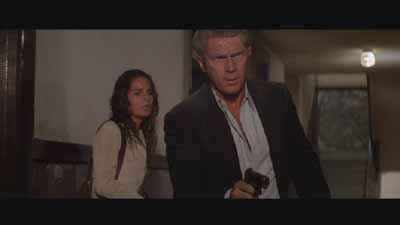
The personification of cool: No. 03 Million.
Instead, you get: an audio commentary with Peckinpah biographers/documentarians Nick Redman, Paul Seydor, Garner Simmons, and David Weddle. These guys go into great depth about Peckinpah, what it takes to make a film like his, the influences, the history between Peckinpah’s life and this film as well as conventions, debacles, and performances. They don’t seem to leave any stone unturned, making you feel as if you might be in a bar one afternoon discussing the films’ particular interesting qualities with them. The sound quality is a little distant, sounding as if they were thirty feet away with reverberations like crazy, but all in all, it’s wonderfully enthralling.
Next up is a "virtual" commentary by Steve McQueen, Ali MacGraw, and Sam Peckinpah (runtime: 10:35). It only runs about 11 minutes, so in reality I feel a little cheated. Possibly because when I see commentary, I think, you know, that it might be regulated to the films entire running time. It’s only a one reel’er and contains a skewed image, slanted to the left for the film, and to the right for stock photographs of the three expounding, via interviews/etc, about the film in question. It’s adequate, but my anger about the relatively short running time didn’t allow me to enjoy it as much as I think I should have.
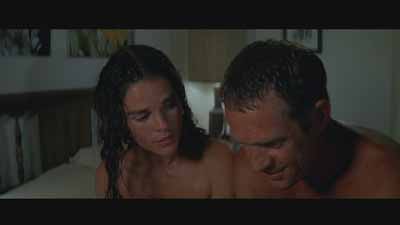
"I know, I’m sorry, it’s just … I can’t stop thinking about Nick Nunziata!"
Finally, there’s the theatrical trailer (runtime: 04:10), which clocks in at about, three hours too long. It does, however, have McQueen saying "shit!", so I’ll give it an endearing pass to the sailor mouths of rebellious yore.
However, these special features aren’t nearly enough as opposed to others in The Essential Steve McQueen Boxed Set.
6.5 out of 10
The Artwork
Classic cool. McQueen, in suit, with his look of approving disapproval on his face seals the deal for anyone interested. It doesn’t hurt that it has guns, people getting shot, and cars on fire, coupled with nearly-nude women wearing money and Ben Johnson and his shifty eyes, all spilled across McQueen’s incredibly buff physique. The rather large gun in McQueen’s pants has to shatter the metaphor to bits.
8.5 out of 10